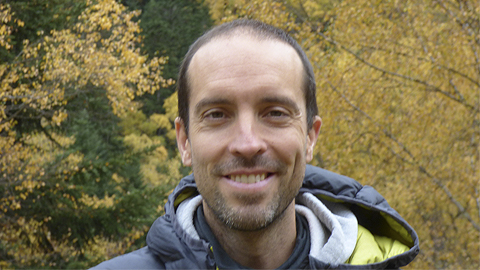Albert Rimola awarded a Consolidator Grant

The universe is a chemically rich environment containing from the simplest molecule, hydrogen (H2), to organically complex molecules (astronomically speaking) such as aminoacids. The different evolutionary stages involved in the formation of a solar/planetary system such as ours are associated to a chemical evolution, in which each stage progressively forms molecules that are structurally more complex and which is ultimately connected to the origin of life. In this context of cosmic chemistry evolution there is currently a heated debate about the possible role of intestellar dust grains. These dust grains are nano and microscopic particles made up mainly of silicates covered in ice on whose surfaces key chemical reactions presumably could be taking place. The chemistry of interstellar dust grains is not fully known. Traditionally, it has been studied through astronomical observations, which are complemented with the use of numerical models and lab experimentsr. Nevertheless, this interdisciplinary approach presents a series of severe limitations which converge in the lack of information at atomic level. This fact prevents researchers from fully understanding the chemical activity occurring in the dust grains, which in turn makes it impossible to know the chemical history behind the formation of solar and planetary systems.
The general objective of the QUANTUMGRAIN project is to reveal, once and for all, the chemistry of interstellar dust grains: from their structural particularities, reactions in which their presence is essential, to knowing exactly what their role is in these reactions. This will be achieved using computational simulations combining sophisticated molecular modelling techniques with advanced quantum chemistry methods, with the aid of supercomputers. The key element in these simulations lies in the fact that they will allow for the first time ever to conduct a virtual zoom at atomic level of the chemical processes taking place on the surface of the grains that are involved in the formation of molecules, thereby providing unique and unprecedented information on these processes. This information will be of great use in answering a series of fundamental aspects which have baffled the astrochemical community for decades, such as which are the main reactions that depend on the presence of dust grains and why.
Albert Rimola hold a BSc in Chemistry (2002, UAB) and a PhD in Theoretical and Computational Chemistry (2007, UAB). From 2007 to 2009 he did a post-doctoral stay at the University of Turin and in 2010 he returned to form part of the UAB's Department of Chemistry. In 2017 he became a Ramón y Cajal researcher. His research focuses on the use of Computational Chemistry to study processes related to the primordial chemical evolution in astronomic and prebiotic chemistry contexts, in which solid state matter plays a relevant role. He has published some 85 scientific articles in international journals and books and has led several publically and privately funded projects. He is currently in charge of the European project ITN-MSCA which began in 2019 and is also related to astrochemistry.
Albert Rimola has been awarded almost two million euros to work on the QUANTUMGRAIN project during the next five years.

